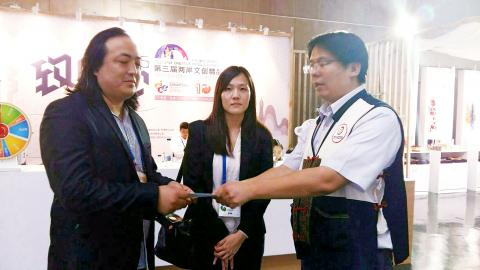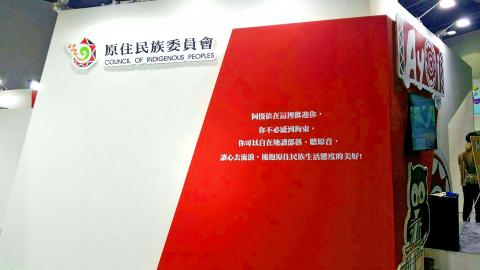The Executive Yuan’s Council of Indigenous Peoples (CIP) on Thursday announced that it has walked out of the Hangzhou Cultural and Creative Industry Expo in China this year, accusing Chinese authorities of trying to force it to reword “indigenous peoples” as “ethnic minorities,” while its title was banned from event material.
The Mainland Affairs Council on Thursday night issued a statement supporting the CIP’s decision, while calling on Beijing to adopt a mutually respectful attitude and to leave politics out of “interactive” events.
Council of Indigenous Peoples Minister Icyang Parod said his council had been notified that all documents and other printed material at the expo should have “ethnic minorities” in place of “indigenous peoples,” adding that Chinese officials said that “ethnic minorities” was its official appellation, as Article 4 of the People’s Republic of China’s (PRC) constitution says: “The nation guarantees the legal rights and benefits of each ethnic minority.”

Photo courtesy of the Council of Indigenous Peoples
Icyang said that adherence to the PRC constitution ignored a 1994 Republic of China (ROC) constitutional amendment that officially recognized Aborigines.
Up until the CIP delegation departed for Hangzhou, it said that the group would be attending the expo without changing its name, Icyang said, adding that the CIP had not expected the hosts to make such demands.
The hosts removed a plaque over an area bearing the CIP’s name, Icyang said, adding that the habitual politicization of what should be simple cultural interactive events was not conducive to harmonious cross-strait relations.

Photo courtesy of the Council of Indigenous Peoples
China was adhering to Han chauvinism by referring to other ethnicities as “minorities,” Democratic Progressive Party Legislator Kolas Yotaka said.
The government and the private sector are willing to work with China on certain issues, but the oppression of Taiwan by Beijing has shown that it is China that is the source of hostility, Kolas said.
Despite the CIP’s expo exit, it said that 10 civilian cultural and creative groups at the event were free to make their own decision about attending, as the government encourages civilian cross-strait interaction.

SECURITY: As China is ‘reshaping’ Hong Kong’s population, Taiwan must raise the eligibility threshold for applications from Hong Kongers, Chiu Chui-cheng said When Hong Kong and Macau citizens apply for residency in Taiwan, it would be under a new category that includes a “national security observation period,” Mainland Affairs Council (MAC) Minister Chiu Chui-cheng (邱垂正) said yesterday. President William Lai (賴清德) on March 13 announced 17 strategies to counter China’s aggression toward Taiwan, including incorporating national security considerations into the review process for residency applications from Hong Kong and Macau citizens. The situation in Hong Kong is constantly changing, Chiu said to media yesterday on the sidelines of the Taipei Technology Run hosted by the Taipei Neihu Technology Park Development Association. With

A US Marine Corps regiment equipped with Naval Strike Missiles (NSM) is set to participate in the upcoming Balikatan 25 exercise in the Luzon Strait, marking the system’s first-ever deployment in the Philippines. US and Philippine officials have separately confirmed that the Navy Marine Expeditionary Ship Interdiction System (NMESIS) — the mobile launch platform for the Naval Strike Missile — would take part in the joint exercise. The missiles are being deployed to “a strategic first island chain chokepoint” in the waters between Taiwan proper and the Philippines, US-based Naval News reported. “The Luzon Strait and Bashi Channel represent a critical access

‘FORM OF PROTEST’: The German Institute Taipei said it was ‘shocked’ to see Nazi symbolism used in connection with political aims as it condemned the incident Sung Chien-liang (宋建樑), who led efforts to recall Democratic Progressive Party (DPP) Legislator Lee Kun-cheng (李坤城), was released on bail of NT$80,000 yesterday amid an outcry over a Nazi armband he wore to questioning the night before. Sung arrived at the New Taipei City District Prosecutors’ Office for questioning in a recall petition forgery case on Tuesday night wearing a red armband bearing a swastika, carrying a copy of Adolf Hitler’s Mein Kampf and giving a Nazi salute. Sung left the building at 1:15am without the armband and apparently covering the book with a coat. This is a serious international scandal and Chinese

COUNTERINTELLIGENCE TRAINING: The ministry said 87.5 percent of the apprehended Chinese agents were reported by service members they tried to lure into becoming spies Taiwanese organized crime, illegal money lenders, temples and civic groups are complicit in Beijing’s infiltration of the armed forces, the Ministry of National Defense (MND) said in a report yesterday. Retired service members who had been turned to Beijing’s cause mainly relied on those channels to infiltrate the Taiwanese military, according to the report to be submitted to lawmakers ahead of tomorrow’s hearing on Chinese espionage in the military. Chinese intelligence typically used blackmail, Internet-based communications, bribery or debts to loan sharks to leverage active service personnel to do its bidding, it said. China’s main goals are to collect intelligence, and develop a